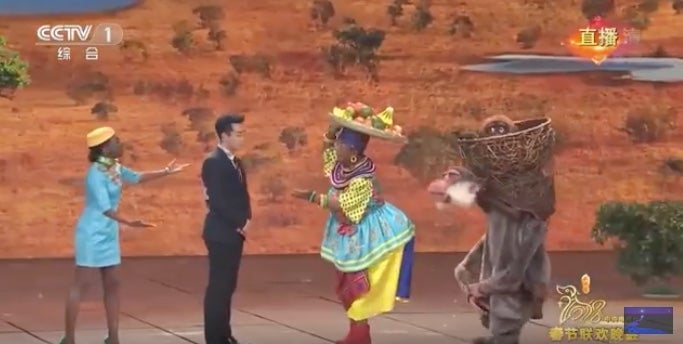China’s state TV ran a racist skit with blackface as Africans for its Lunar New Year show
In what is probably one of the world’s most watched non-sports live broadcasts, Chinese state television thought blackface was a fitting tribute to Sino-African relations.


In what is probably one of the world’s most watched non-sports live broadcasts, Chinese state television thought blackface was a fitting tribute to Sino-African relations.
As part of CCTV’s New Year’s Gala on Thursday (Feb. 15), producers included a skit about Africa that had a Chinese actress in blackface and prosthetics meant to be protruding buttocks and large breasts. The annual variety show forms part of Lunar New Year celebrations, and has an estimated 800 million viewers.
The skit opens with Shakira’s “Waka Waka (This Time for Africa)”—produced for the 2010 FIFA World Cup in South Africa—and a group of African dancers in generic costumes that were meant to be traditional gear on a stage with a jungle backdrop and animal puppets.
The plot of the 13-minute skit sees the presenter’s African friend ask him to pose as her date to avoid a blind date her mother has set up for her. Enter actress, playwright and producer Lou Naiming in blackface with a basket of fruit on her head. She’s accompanied by a monkey, played by a black actor.
At the end of the skit, when the presenter’s Chinese bride exposes the lie, the mother character apparently says she can’t be angry “because China has done so much for Africa…I love Chinese people! I love China!,” according to What’s on Weibo, a site that monitors China’s social media network.

The skit was meant to highlight China’s relationship with Africa and the success of China’s One Belt One Road policy that has seen numerous infrastructure programs and Chinese investment in Africa surpass the US and UK. Instead it betrayed just how skewed that relationship has been, exposing an uncomfortable truth with the African characters in the skit portrayed as ingratiatingly grateful to the Chinese characters.
“Awareness of blackface and its dubious connotations in the West are low in China and other Asian countries,” wrote the South China Morning Post. That’s been the excuse several times over the last few years as Chinese advertisers and artists face accusations of racism over their portrayal of black people.
The film Wolf Warriors 2 is set in a generic African country where the hero must save Chinese nationals from African mercenaries, all while peddling China’s own version of the White Savior trope at the expense of hapless Africans. Last year, a gallery in Wuhan hosted an exhibition titled “This is Africa” showing side-by-side comparisons of Africans and monkeys. There was also the laundry detergent advertisement that saw a black man have his skin color scrubbed off, causing outrage within and outside China.
The advertisement and the exhibition were taken down, but the film went on to become China’s highest grossing film yet. As a relatively new, yet influential, player in geopolitics claiming ignorance about an international understanding of race relations just isn’t good enough anymore. Especially as an increasing number of Africans live and study in China.
Those defending the skit point to the fact that China never colonized Africa or that there were African performers on stage. Neither selective history, nor the complicity of people of color make racism acceptable—just ask Dove, Nivea, H&M, the Netherlands and others.
And it seems that some Chinese audiences immediately recognizied how problematic the skit was. What’s on Weibo tracked a surge in the use of the words “awkward” and “racist” in messages related to the skit. It’s an acknowledgement that there is a conversation happening in China on understanding racism and prejudice.